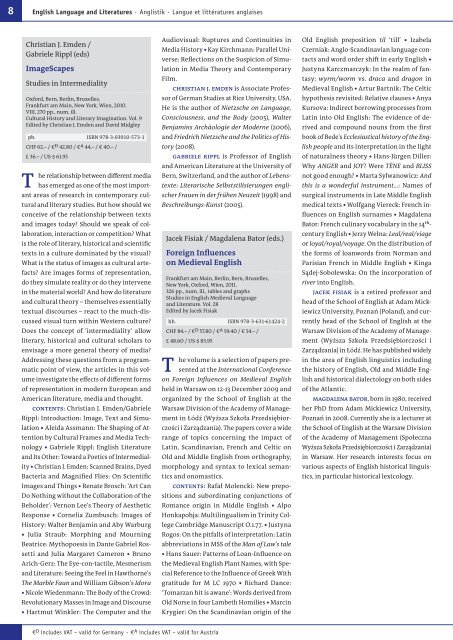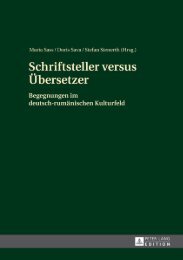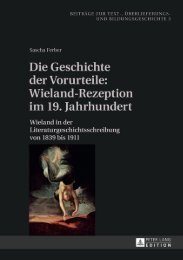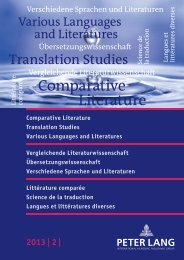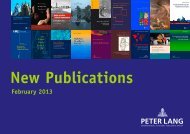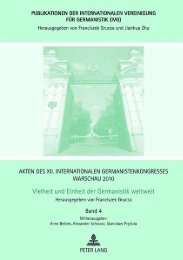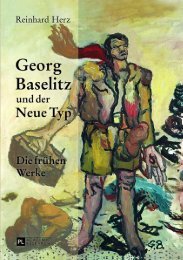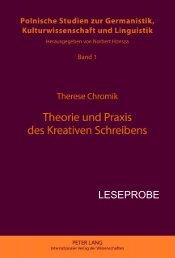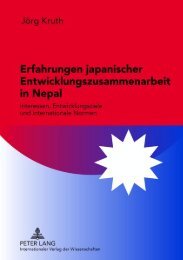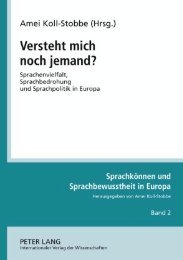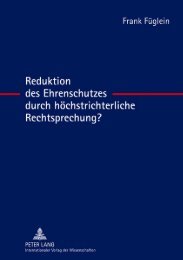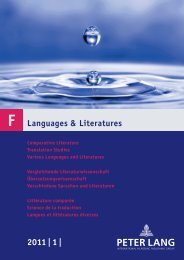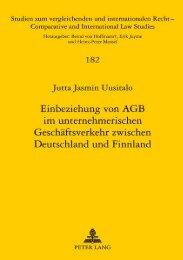Languages & Literatures 2011 | 1 | - Peter Lang
Languages & Literatures 2011 | 1 | - Peter Lang
Languages & Literatures 2011 | 1 | - Peter Lang
You also want an ePaper? Increase the reach of your titles
YUMPU automatically turns print PDFs into web optimized ePapers that Google loves.
8 English <strong>Lang</strong>uage and <strong>Literatures</strong> · Anglistik · <strong>Lang</strong>ue et littératures anglaises<br />
Christian J . Emden /<br />
Gabriele Rippl (eds)<br />
ImageScapes<br />
Studies in Intermediality<br />
Oxford, Bern, Berlin, Bruxelles,<br />
Frankfurt am Main, New York, Wien, 2010 .<br />
VIII, 270 pp ., num . ill .<br />
Cultural History and Literary Imagination . Vol . 9<br />
Edited by Christian J . Emden and David Midgley<br />
pb . ISBN 978-3-03910-573-1<br />
CHF 62 .– / € D 42 .80 / € A 44 .– / € 40 .– /<br />
£ 36 .– / US-$ 61 .95<br />
T<br />
he relationship between different media<br />
has emerged as one of the most important<br />
areas of research in contemporary cultural<br />
and literary studies . But how should we<br />
conceive of the relationship between texts<br />
and images today? Should we speak of collaboration,<br />
interaction or competition? What<br />
is the role of literary, historical and scientific<br />
texts in a culture dominated by the visual?<br />
What is the status of images as cultural artefacts?<br />
Are images forms of representation,<br />
do they simulate reality or do they intervene<br />
in the material world? And how do literature<br />
and cultural theory – themselves essentially<br />
textual discourses – react to the much-discussed<br />
visual turn within Western culture?<br />
Does the concept of ‘intermediality’ allow<br />
literary, historical and cultural scholars to<br />
envisage a more general theory of media?<br />
Addressing these questions from a programmatic<br />
point of view, the articles in this volume<br />
investigate the effects of different forms<br />
of representation in modern European and<br />
American literature, media and thought .<br />
ContentS: Christian J . Emden/Gabriele<br />
Rippl: Introduction: Image, Text and Simulation<br />
• Aleida Assmann: The Shaping of Attention<br />
by Cultural Frames and Media Technology<br />
• Gabriele Rippl: English Literature<br />
and Its Other: Toward a Poetics of Intermediality<br />
• Christian J . Emden: Scanned Brains, Dyed<br />
Bacteria and Magnified Flies: On Scientific<br />
Images and Things • Renate Brosch: ‘Art Can<br />
Do Nothing without the Collaboration of the<br />
Beholder’: Vernon Lee’s Theory of Aesthetic<br />
Response • Cornelia Zumbusch: Images of<br />
History: Walter Benjamin and Aby Warburg<br />
• Julia Straub: Morphing and Mourning<br />
Beatrice: Mythopoesis in Dante Gabriel Ros-<br />
setti and Julia Margaret Cameron • Bruno<br />
Arich-Gerz: The Eye-con-tactile, Mesmerism<br />
and Literature: Seeing the Feel in Hawthorne’s<br />
The Marble Faun and William Gibson’s Idoru<br />
• Nicole Wiedenmann: The Body of the Crowd:<br />
Revolutionary Masses in Image and Discourse<br />
• Hartmut Winkler: The Computer and the<br />
€ D includes VAT – valid for Germany · € A includes VAT – valid for Austria<br />
Audiovisual: Ruptures and Continuities in<br />
Media History • Kay Kirchmann: Parallel Uni-<br />
verse: Reflections on the Suspicion of Simu-<br />
lation in Media Theory and Contemporary<br />
Film .<br />
ChRiStian J. eMden is Associate Professor<br />
of German Studies at Rice University, USA .<br />
He is the author of Nietzsche on <strong>Lang</strong>uage,<br />
Consciousness, and the Body (2005), Walter<br />
Benjamins Archäologie der Moderne (2006),<br />
and Friedrich Nietzsche and the Politics of History<br />
(2008) .<br />
gaBRiele RiPPl is Professor of English<br />
and American Literature at the University of<br />
Bern, Switzerland, and the author of Lebenstexte:<br />
Literarische Selbststilisierungen englischer<br />
Frauen in der frühen Neuzeit (1998) and<br />
Beschreibungs-Kunst (2005) .<br />
Jacek Fisiak / Magdalena Bator (eds .)<br />
Foreign Influences<br />
on Medieval English<br />
Frankfurt am Main, Berlin, Bern, Bruxelles,<br />
New York, Oxford, Wien, <strong>2011</strong> .<br />
326 pp ., num . ill ., tables and graphs<br />
Studies in English Medieval <strong>Lang</strong>uage<br />
and Literature . Vol . 28<br />
Edited by Jacek Fisiak<br />
hb . ISBN 978-3-631-61424-2<br />
CHF 84 .– / € D 57 .80 / € A 59 .40 / € 54 .– /<br />
£ 48 .60 / US-$ 83 .95<br />
T<br />
he volume is a selection of papers presented<br />
at the International Conference<br />
on Foreign Influences on Medieval English<br />
held in Warsaw on 12-13 December 2009 and<br />
organized by the School of English at the<br />
Warsaw Division of the Academy of Management<br />
in Łódź (Wyższa Szkoła Przedsiębiorczości<br />
i Zarządzania) . The papers cover a wide<br />
range of topics concerning the impact of<br />
Latin, Scandinavian, French and Celtic on<br />
Old and Middle English from orthography,<br />
morphology and syntax to lexical semantics<br />
and onomastics .<br />
ContentS: Rafał Molencki: New prepositions<br />
and subordinating conjunctions of<br />
Romance origin in Middle English • Alpo<br />
Honkapohja: Multilingualism in Trinity College<br />
Cambridge Manuscript O .1 .77 . • Justyna<br />
Rogos: On the pitfalls of interpretation: Latin<br />
abbreviations in MSS of the Man of Law’s tale<br />
• Hans Sauer: Patterns of Loan-Influence on<br />
the Medieval English Plant Names, with Special<br />
Reference to the Influence of Greek With<br />
gratitude for M LC 1970 • Richard Dance:<br />
‘Tomarzan hit is awane’: Words derived from<br />
Old Norse in four Lambeth Homilies • Marcin<br />
Krygier: On the Scandinavian origin of the<br />
Old English preposition til ‘till’ • Izabela<br />
Czerniak: Anglo-Scandinavian language con-<br />
tacts and word order shift in early English •<br />
Justyna Karczmarczyk: In the realm of fantasy:<br />
wyrm/worm vs . draca and dragon in<br />
Medieval English • Artur Bartnik: The Celtic<br />
hypothesis revisited: Relative clauses • Anya<br />
Kursova: Indirect borrowing processes from<br />
Latin into Old English: The evidence of de-<br />
rived and compound nouns from the first<br />
book of Bede’s Ecclesiastical history of the Eng-<br />
lish people and its interpretation in the light<br />
of naturalness theory • Hans-Jürgen Diller:<br />
Why ANGER and JOY? Were TĒNE and BLISS<br />
not good enough? • Marta Sylwanowicz: And<br />
this is a wonderful instrument…: Names of<br />
surgical instruments in Late Middle English<br />
medical texts • Wolfgang Viereck: French in-<br />
fluences on English surnames • Magdalena<br />
Bator: French culinary vocabulary in the 14th-<br />
century English • Jerzy Wełna: Leal/real/viage<br />
or loyal/royal/voyage . On the distribution of<br />
the forms of loanwords from Norman and<br />
Parisian French in Middle English • Kinga<br />
Sądej-Sobolewska: On the incorporation of<br />
river into English .<br />
JaCeK FiSiaK is a retired professor and<br />
head of the School of English at Adam Mickiewicz<br />
University, Poznań (Poland), and currently<br />
head of the School of English at the<br />
Warsaw Division of the Academy of Management<br />
(Wyższa Szkoła Przedsiębiorczości i<br />
Zarządzania) in Łódź . He has published widely<br />
in the area of English linguistics including<br />
the history of English, Old and Middle English<br />
and historical dialectology on both sides<br />
of the Atlantic .<br />
Magdalena BatoR , born in 1980, received<br />
her PhD from Adam Mickiewicz University,<br />
Poznań in 2008 . Currently she is a lecturer at<br />
the School of English at the Warsaw Division<br />
of the Academy of Management (Społeczna<br />
Wyższa Szkoła Przedsiębiorczości i Zarządzania)<br />
in Warsaw . Her research interests focus on<br />
various aspects of English historical linguistics,<br />
in particular historical lexicology .


